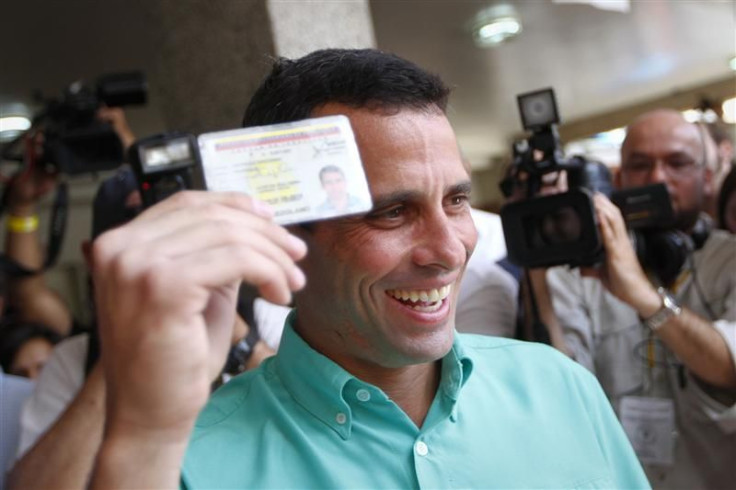Venezuela Opposition Chooses Challenger to Chavez

(Reuters) - Venezuela's opposition coalition confirmed on Sunday that Miranda state governor Henrique Capriles had won a primary before the South American nation's presidential election.
Capriles won 1.8 million votes of 2.9 million cast, the head of the coalition's election board told reporters.
With all of Venezuela's 18 million registered voters able to take part, all eyes were on turnout as the clearest test yet of the opposition's strength and chances of ending 13 years of Chavez's socialist revolution.
The reaction of Sunday's losers will show if the fledgling Democratic Unity coalition is ready to rally behind the winner and mount a dynamic campaign for the Oct. 7 election that could chip away at the president's still-dominant popularity.
Capriles, 39, defeated another governor, Pablo Perez, 42, and three other candidates.
I aim to be a president who talks much less, who doesn't invade Venezuelans' personal lives so much, Capriles said in a pointed reference to Chavez's longwinded speeches, which local media are often obliged to run live.
The real game begins on Feb. 13, he added, relishing the chance of a showdown.
Capriles hails Brazil's market-friendly but socially conscious policy model as his inspiration and has said he would take a no shocks approach to dismantling Chavez's statist economic policies such as currency controls.
He might move faster to end controversial friendships with anti-U.S. figures such as the leaders of Iran, Cuba and Belarus.
RISK OF TROUBLE
There were no clear exit polls, but some informal surveys suggested Perez might be doing better than predicted. The governor of Zulia state has projected himself as the candidate of the poor and has a formidable party machine behind him.
Voting was smooth with long, orderly queues around pro-opposition neighborhoods of the capital Caracas where walls were plastered with the candidates' posters. Young activists rode motorbikes exhorting voters to head to the polls.
Chavez strongholds were largely devoid of opposition propaganda, however, and state TV gleefully broadcast images of some semi-deserted polling centers with just one or two voters.
Reading a newspaper in a sunny square deep in the pro-government January 23 area on hills above Chavez's presidential palace, 66-year-old retired pharmacy assistant Ramon Paraera said no one would beat the president.
Chavez is helping the people. He's with the people, not the bourgeoisie, he said, sitting below a mural of revolutionary heroes including Ernesto Che Guevara.
Results were expected from around 8 p.m. (0030 GMT on Monday) on Sunday. Whoever is anointed as Chavez's official challenger, supporters in the OPEC nation will hope the other opposition candidates quickly endorse the winner.
We will all wait for the results arm-in-arm, Perez said.
Peru's conservative Nobel literature laureate Mario Vargas Llosa praised the coalition for transcending the mediocre, divided opposition of Venezuela's past and avoiding cannibalism during the primary - in contrast to the U.S. Republican race going on to the north.
Who says there can't be a Venezuelan spring? he wrote.
Despite a surge of opposition optimism, polls put Chavez, 57, well in the lead for October - but that could change if the opposition runs an appealing and inclusive campaign.
Some experts warn that political violence could undermine the outcome - whoever wins the general election.
Venezuela has largely avoided political bloodshed despite the deep polarization of Chavez's rule and a volatile mix of police corruption, the presence of organized criminal gangs, impunity and millions of guns in civilian hands.
The defense minister repeated on Sunday that the military were loyal Chavistas. The opposition accuses him of planning to reject any opposition win on October 7, fueling more mistrust.
HUGE OIL INDUSTRY
At stake is control of the biggest crude reserves in the world and state oil company PDVSA, which despite declining output still sends more than three quarters of a million barrels a day to the United States and about half a million to China.
Chavez has nationalized almost all Venezuela's oil industry over the years, kicking out U.S. majors and putting PDVSA in charge of multibillion dollar projects. The opposition deny government allegations they plan to privatize the company.
Energy minister and PDVSA boss Rafael Ramirez said this week that the opposition had a hidden agenda for the oil industry.
They don't want to say much because what they're proposing is a retreat from everything that we've done ... to the detriment of our sovereignty and people, he told state TV.
Never out of the spotlight, Chavez attended a rally on Sunday in north-central Aragua state to celebrate the 198th anniversary of the Batalla de La Victoria (Battle of Victory) there against Spanish forces.
Following cancer surgery last year, Chavez seems to be continuing to recover and is making ever longer TV appearances, including a record speech last month of nearly 10 hours.
We cannot let Venezuela lose its independence, said Chavez, who often mocks his political foes as U.S. stooges and sell-outs. Especially not after these 13 years of battle.
(Additional reporting by Girish Gupta; Editing by Andrew Cawthorne and Sandra Maler)
© Copyright Thomson Reuters 2024. All rights reserved.




















